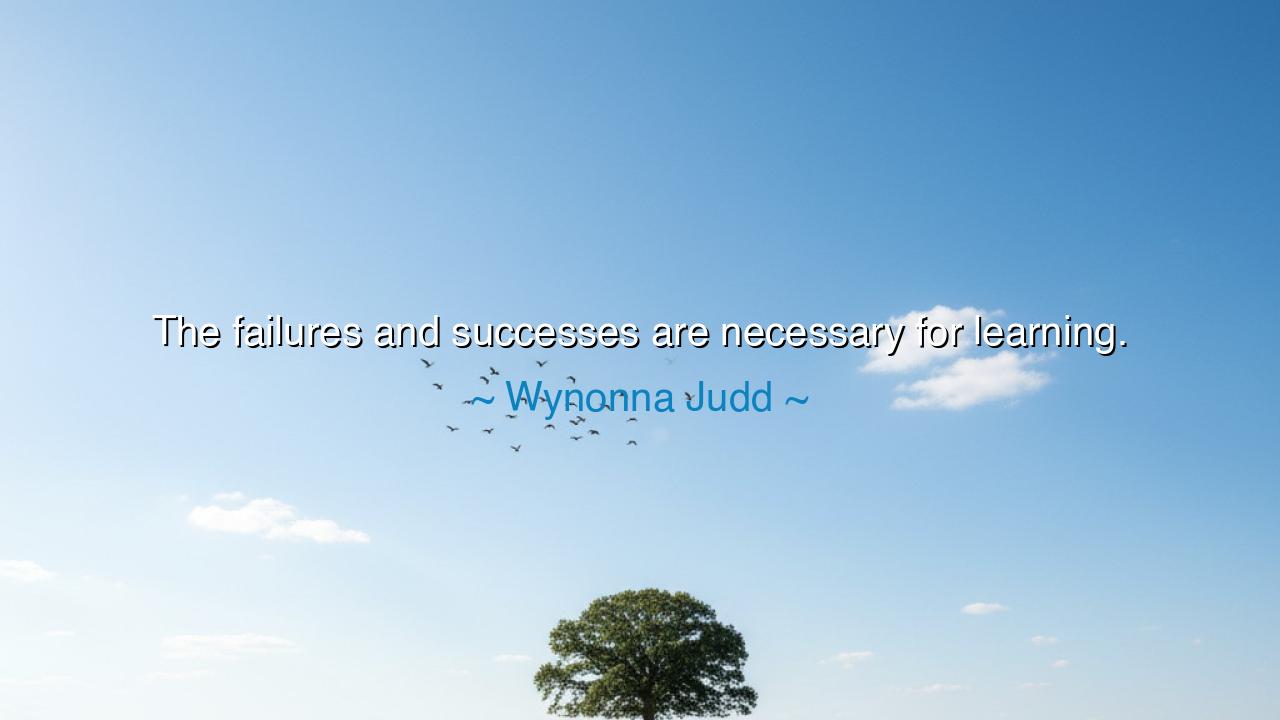
The failures and successes are necessary for learning.






Hear the wise words of Wynonna Judd, who declared with simplicity and power: “The failures and successes are necessary for learning.” In this brief utterance lies the essence of all growth, the rhythm of life itself. For no man or woman comes into the world fully formed; each is shaped by trial and triumph, by wounds and victories alike. To deny this is to deny the very process by which the soul is tempered, as iron is forged by both hammer and flame.
The ancients understood this truth well. They taught that failure is not the enemy, but the stern teacher, while success is the gentler guide. Each is incomplete without the other. Failure humbles, reminding us of our limits, stripping us of arrogance, and urging us to rise anew. Success uplifts, filling the heart with courage and showing that perseverance bears fruit. Without failure, we would grow reckless; without success, we would grow hopeless. Together, they form the twin pillars of true wisdom.
Consider the tale of Thomas Edison, who sought to create the electric light. He failed not once or twice, but thousands of times, each attempt a blow that might have crushed a weaker spirit. Yet Edison declared that he had not failed, but merely found “ten thousand ways that did not work.” And at last, through persistence, his lamp burned bright, altering the course of history. His life illustrates Judd’s words: that both the failed experiments and the triumphant one were necessary for his learning.
But this truth is not confined to inventors and sages—it belongs to every human life. The farmer who plants and loses his crops to storm learns to plant differently the next season. The child who stumbles in walking learns balance through the fall. The singer who cracks a note on stage gains discipline in practice, while the applause of her triumph fuels her spirit to continue. In all these things, it is the dance between loss and gain that deepens wisdom.
Judd’s words also remind us of the danger of fearing failure. Too often, people halt their journey at the first sign of defeat, believing that failure marks the end. Yet, as the ancients taught, failure is not a wall, but a doorway—painful to cross, yet leading to new strength. The one who flees failure flees growth; the one who embraces it, learns. Likewise, the one who clings only to success risks pride, forgetting that every victory was built upon many hidden defeats.
The lesson is clear: do not despise either failure or success, for both are teachers sent to shape you. Let failure guide you toward humility, resilience, and patience. Let success remind you of the joy that comes from perseverance. When you stumble, rise; when you triumph, give thanks. Both moments are steps upon the same path, each one drawing you closer to mastery, to wisdom, and to peace.
Practical action lies before us. When you fail, pause not in despair, but ask: What lesson hides within this pain? Write it down, remember it, and let it shape your next attempt. When you succeed, do not rest in pride, but ask: What strength brought me here, and how can I share it? Celebrate, but remain watchful, for success too can teach. And above all, keep walking, for it is the journey itself—marked by both loss and triumph—that makes the soul strong.
Thus, Wynonna Judd’s words ring across the ages as a teaching for all generations: failures and successes are necessary for learning. Neither is to be rejected, neither to be worshipped, but both embraced as companions on the road. Remember this, and you will find that every step, whether joyous or bitter, becomes part of the wisdom that leads you home.






AAdministratorAdministrator
Welcome, honored guests. Please leave a comment, we will respond soon